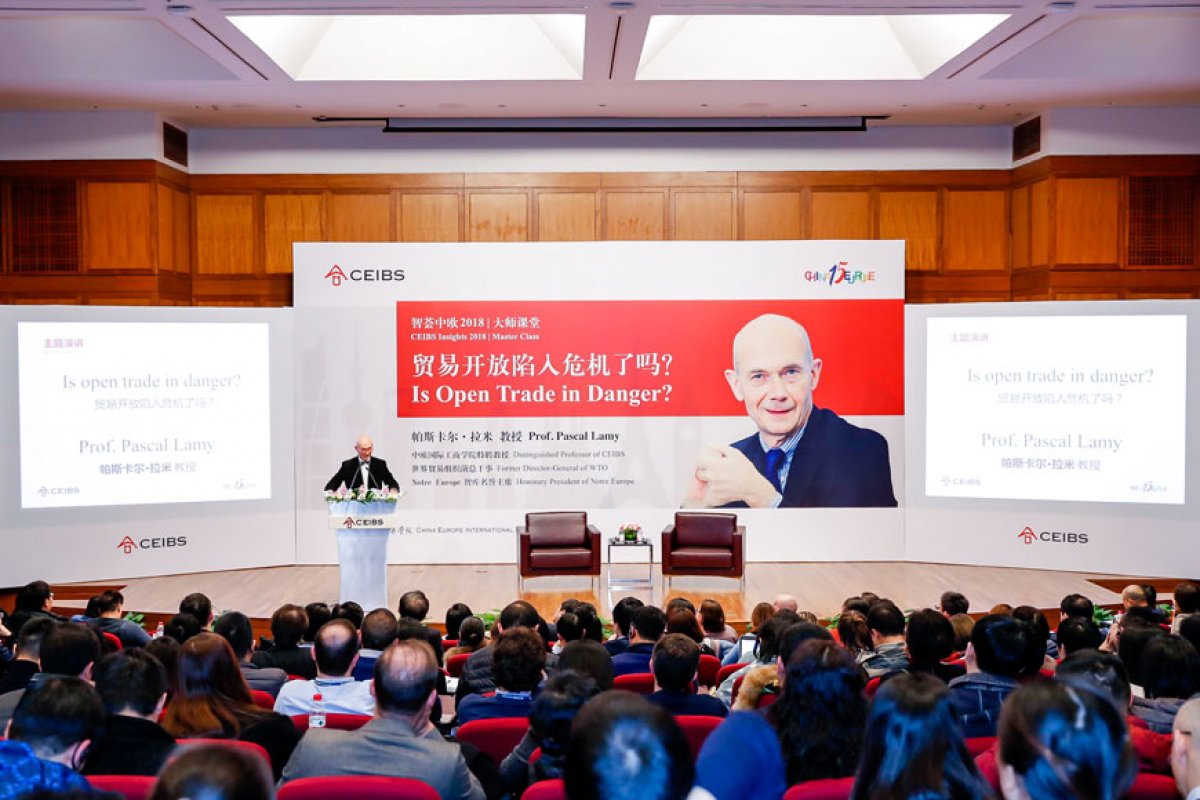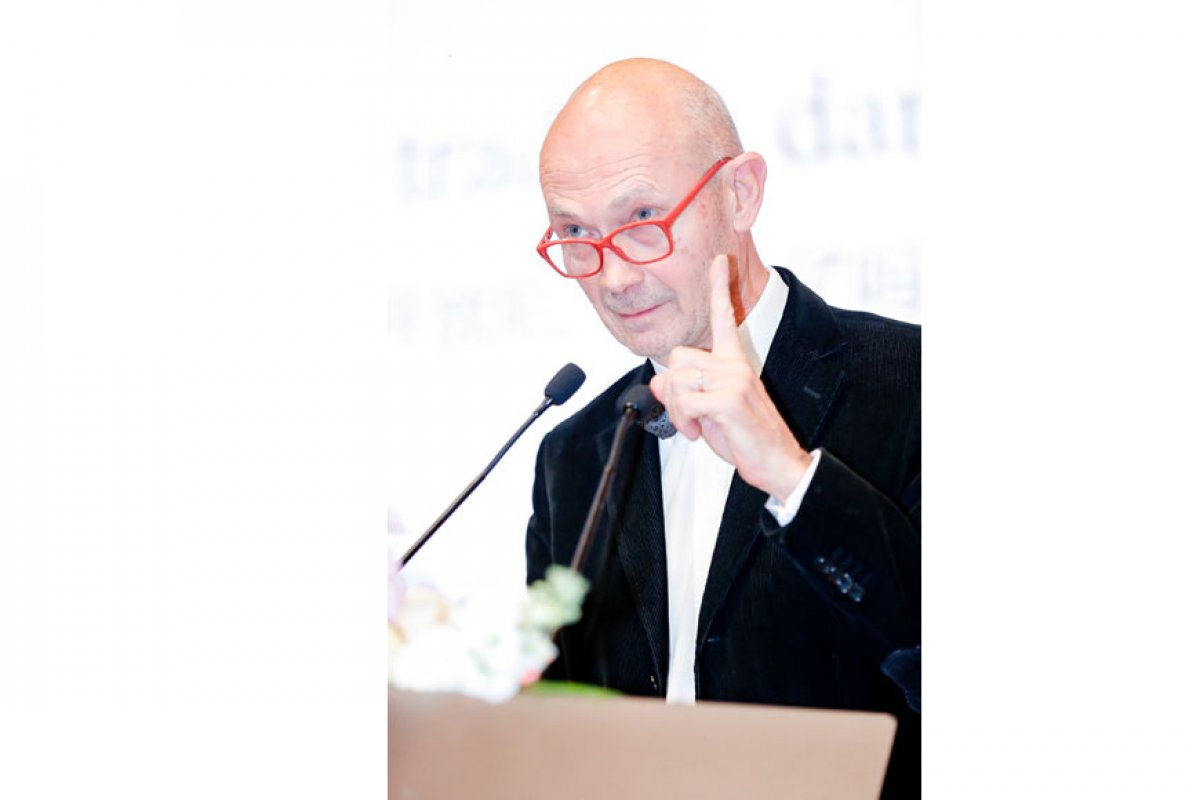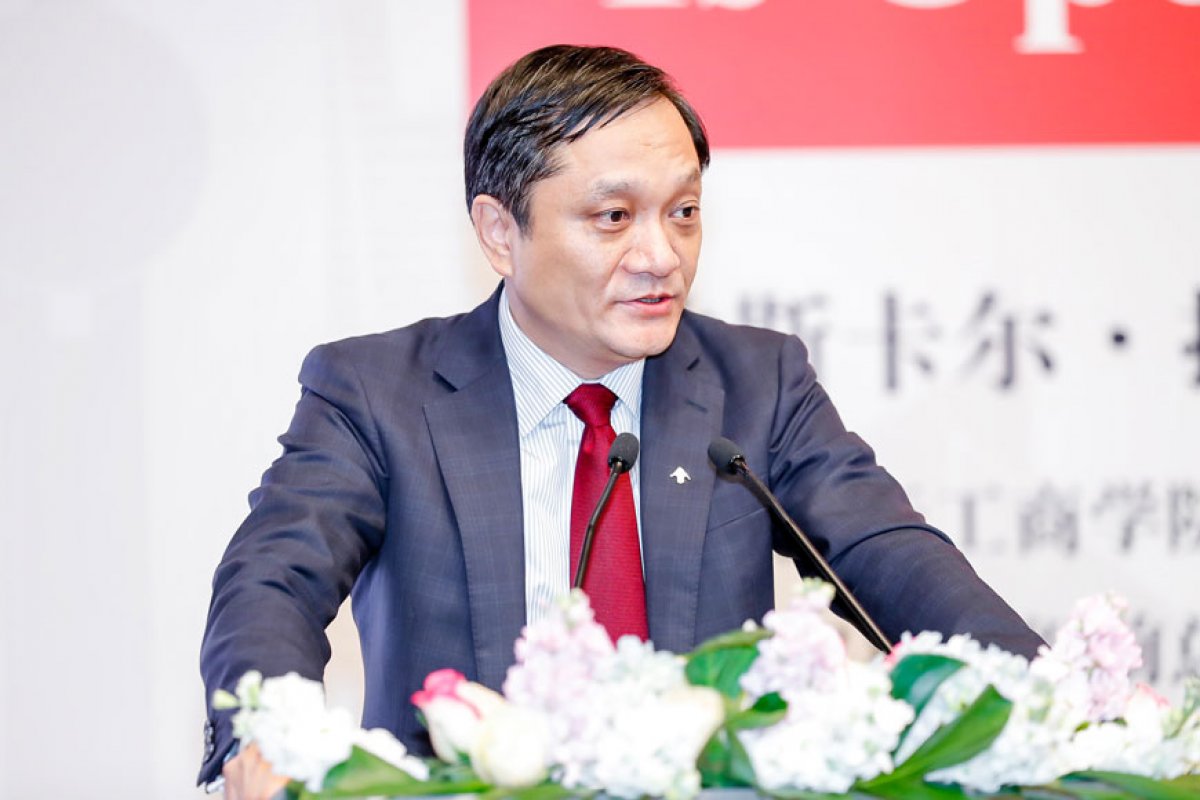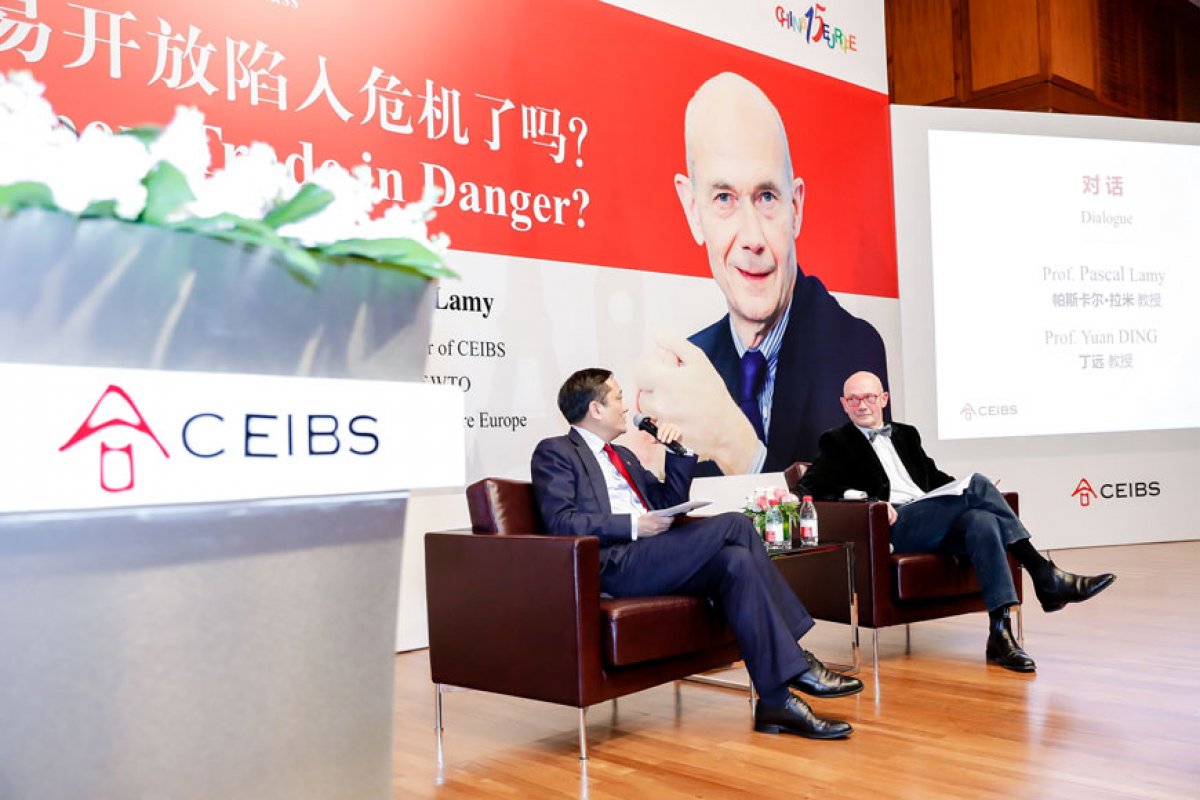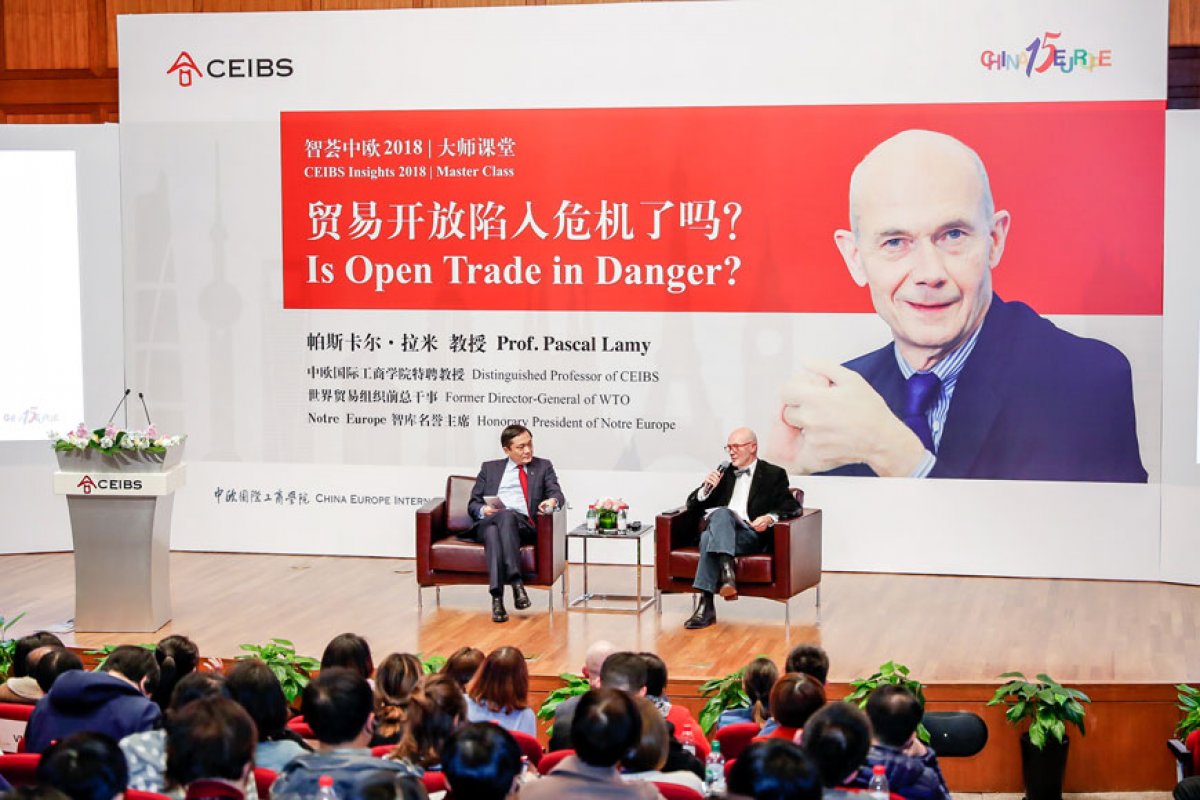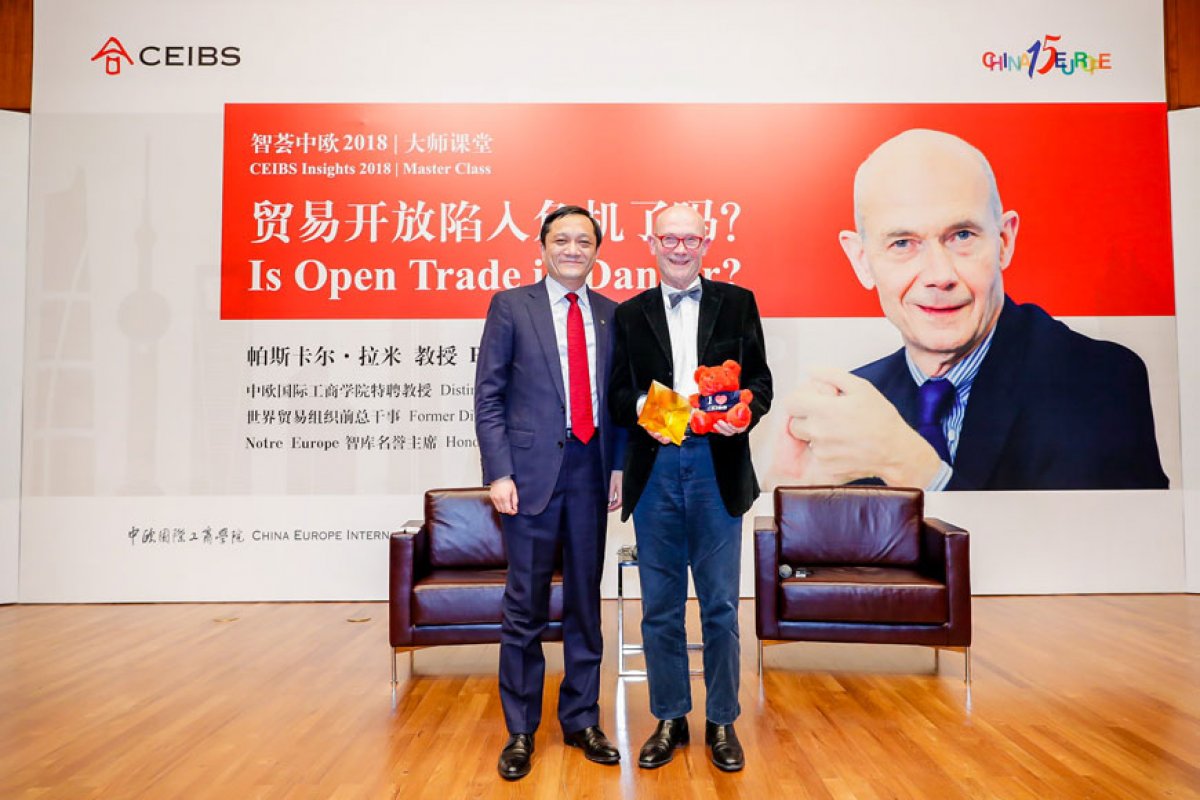Former WTO Director-General Pascal Lamy Headlines CEIBS Master Class
December 11, 2018. Shanghai – Former Director-General of the World Trade Organisation (WTO), Pascal Lamy says WTO reform is just a part of the answer in addressing the current push back on trade, and needs to be complemented by strengthening domestic systems to lessen the pain that naturally comes from engaging in open trade. He made the comments during a Master Class at China Europe International Business School (CEIBS) this evening in his first major speech since joining the CEIBS faculty as Distinguished Professor earlier this month.
“The more [open trade] is efficient for many, the more it is painful for some,” he explained. “The US has the weakest social system because the American Dream is that everybody has a chance; it’s up to you to take [the chance], not for the state to address problems of inequality.”
Lamy believes more needs to be done to address the concerns of those who have not benefited from open trade as much as others, as this would help stem the anti-trade, anti-globalisation wave now seen in sections of the global economy. “Open trade is good overall; but telling those who lose from it that ‘it’s good for many people, too bad it’s not good for you’ doesn’t work anymore,” he told an audience of about 300 that turned out to hear his views on whether open trade is in danger. There is a need, he said, to address issues such as unemployment and pensions, and other social safety nets that can effectively alleviate any negative fallout from economies engaging in open trade.
During his speech, he outlined the origins of trade opening, the current climate towards it, and where we need to go from here. He explained that, for several decades, open trade had benefited from a convergence of five cylinders that powered its growth: doctrine, action, technology, finance, and results. But times have changed. “This convergence is now under strain. If we look at recent developments, now each of the five cylinders has a problem and the engine has lost a lot of power,” he said.
In the past, Lamy said, there had been rapid globalisation of the financial industry, with liberalisation of capital flow and deregulation of financial systems in some countries spurring investments abroad. The last global financial crisis, however, had eroded many of those gains.
“The US financial system exploded with the sub-prime crisis of 2007/ 2008 which led to a global economic crisis which has left very serious, very severe, and lasting consequences in many countries: recession, shrinking public expenditure as [the funds were] pumped into restructuring bankrupt financial systems,” Lamy said. “The reaction was to re-regulate the financial industry, which led to a re-clustering of the financial industry which had been de-clustered in the previous period.” In China, he added, the result was disruption to the progress being made in trade opening and liberalisation, and in addressing the issue of the level of support provided to the country’s state owned enterprises. “In order to cope with this crisis, China [resumed] growing the part of the Chinese economy under state command. This is one of the consequences of the 2008 crisis,” he said.
Lamy also told the audience that, whereas in the past, concrete action was being taken that contributed to growth and “a period of happy globalisation”, in recent years these efforts have become less efficient – both at the international and domestic level. The WTO, he said, is using the outdated rule book of the 1990s, is less efficient at helping ensure there is a level playing field and open trade, and is also less efficient at distributing the benefits of global trade. “The number of losers might not have been bigger, but the treatment of the losers was harsher, thus creating discontent; hence the beginning of these populist, anti-trade stances which we have seen mostly in the US and, to a lesser extent, in Europe,” said Lamy.
He also pointed to the difference between the results of open trade seen then, as opposed to now. In the past, open trade played a major role in expansion of international trade and economic growth, which led to an increase in welfare that then helped make any pain experienced easier to bear. This then led to the formation of global supply chains, with a move away from producing one final product to instead focusing on market segments where countries had a comparative advantage. But with the financial crisis-induced growth slowdown of the last 5-10 years, the results have been less impressive, inequalities have increased, populism is now spreading in many countries, and protectionism is on the rise, he said.
In the past, there had been a broad consensus, a doctrine, that open trade is a win-win game, that it creates efficiencies and that for it to work there needs to be a reasonable playing field. There was also the recognition that there would be some pain for those who have to adjust to the new competitive landscape of open trade, and that domestic systems would be put in place to address this. “[The view was that] it works because it is painful and it is painful because it works. [It was accepted that] at the domestic level, you need proper systems that help reduce social insecurity,” Lamy explained.
But Donald Trump’s election changed all that.
The former WTO leader told the audience that Trump’s approach to trade is not win-win, but is instead a zero sum game, as if the US were a “big real estate company” and the aim is to “buy cheap and sell pricey”. “That’s totally at odds with the previous doctrine,” said Lamy. Adding that Trump holds the mercantilist view that exports are good and imports are bad, he argued that the US President’s obsession with his country’s trade deficit is misplaced. “If Trump measures his success [by how well he does] in shrinking the US trade deficit, it’s going to be a failure. Most of us know the US trade deficit is not a trade problem but a structural deficiency [because US consumers spend more and save less than most].” Lamy also noted that, in addition to the Trump effect, the doctrine has also changed as a result of changing times. For example, whereas protecting producers used to be the main driver behind erecting hurdles to open trade, today non-tariff measures (standards, regulations, certification, etc.) are increasingly important. “Now non-tariff measures are probably four times more important than tariff measures in trade,” said Lamy. “We have a series of obstacles to trade, leading to difficulties that were not there before. The consensus we previously had has been eroded.”
Turning his attention to another cylinder of open trade, Lamy made the point that in the past technology had helped fuel the expansion of international trade by reducing the costs associated with the distance between trading partners. In contrast, technology now poses a challenge as new frameworks need to be established to deal with issues related to the administration, access, protection, and globalisation of data. This is especially formidable as the US, EU, and China each have different approaches to how they handle data, he said.
He also noted that, in addition to the challenges that have emerged for each of the five cylinders that once used to bolster the argument for open trade, current tensions have been fuelled by the rising rivalry between the US and China. Unlike the previous US approach of accepting China’s rise as inevitable and encouraging the country to take on the responsibility that accompanies its increasing power, Trump’s approach is drastically different. The focus now is on curtailing China and, according to Lamy, the current US strategy is to undermine China’s ability to grow.
“China’s legitimacy lies in its growth performance, that’s the view both internationally and domestically. The reality is that this outstanding growth performance owes quite a lot to international trade. A lot of Chinese growth was through exports, it benefited from low labour costs and will still do so for the next 10-20 years,” said Lamy. He acknowledged the role domestic consumption has played in that growth but believes exports will continue to grow, leaving the US unimpressed by China’s increasing imports and shrinking trade surplus.
Faced with these challenges, Lamy provided suggestions on what can be done to preserve open trade in the future. These include strengthening the multilateral system, beginning with the multilateral trade system, meaning reforming the WTO. The need for a reformation of the organisation is the only thing Trump is right about when it comes to trade, he quipped. He specifically spoke of the need for the WTO to address the issue of subsidisation, an area in which he believes it is too weak. This, he believes, needs to be done in the short term and would help address the long-standing issue of whether China’s SOEs have an unfair advantage. He also spoke of the need to address, in the short term, US concerns about whether or not there is a level playing field when it comes to open trade.
Issues that he believes need to be addressed in the medium term include non-tariff measures which go beyond the scope and mandate of the WTO such as standardisation, which is vital for economies of scale to be effective; wider environmental issues; and providing a level playing field when it comes to data. There will also be a need to address the stabilisation of the financial industry, which needs to be globally regulated to prevent a repeat of the last financial crisis, as well as a reform of the international monetary system, including reassessing the US dollar’s role as a global currency, he said. “I don't think, in a world which is globalised the way it is, we can very long allow the dollar to keep its supremacy. There will have to be some sort of diversification of the currency system worldwide,” Lamy added.
He stressed that in order for the suggestions he proposed to work, they need to be balanced with strengthened domestic systems.
Lamy remains optimistic that, despite the push back on open trade and anti-globalisation sentiments from some quarters, there will be no widespread move away from globalisation. The US’ efforts may lead to shifts in the global supply chain, but it is merely a redistribution, not a reduction. “Trump is trying to de-globalise the US and China. He probably will get that done to some extent for socks, washing machines, ships; but this decrease in globalisation will be compensated for by an increase in globalisation elsewhere,” said Lamy. “This is why I am not that pessimistic, because globalisation offers good solutions to partial de-globalisation of this kind.”
Lamy also believes that the current extent of the world’s globalisation can withstand any shocks. He pointed to Britain’s messy attempt to extricate itself from the EU as one example of “mini” de-globalisation, saying it was a good example of why integration is good and why de-integration is difficult. “I don't think de-globalisation will happen,” he said.
Lamy’s Master Class is the final one in a series hosted by CEIBS this year to mark the 15th anniversary of the China-EU Comprehensive Strategic Partnership. As CEIBS Vice President & Dean Ding Yuan noted in his introduction, Lamy’s speech came at the perfect time to shed light on trade issues and at a historic point where the global economy is attempting to “navigate unknown waters”.
For his part, Lamy welcomed the opportunity to spend a week at CEIBS in his capacity as a member of the faculty. “CEIBS is a success story in EU-China cooperation that deserves to be celebrated,” he said. “I’m happy to share some of my knowledge and experience with faculty and students here. Teaching is also learning and I consider that to keep learning at my very advanced age is a huge privilege, which I am happy to share with you.”
Lamy’s visit to CEIBS began on Monday with a day of interviews with BBC TV, WSJ, ARD German Radio, Spanish media group Vocento, China Daily, China Global Television Network (CGTN), and Yicai Global. Ahead of his Master Class this evening he spoke with Chinese journalists. On December 12, he will lecture during the Key Talent Programme for Chinese Companies Going Global. The lecture will be followed by a frank discussion with CEOs from MNCs doing business in Asia on how they can adjust their strategy as we enter the next decade. The discussion will take place against the backdrop of the possibility that multilateral trading blocks may give way to bilateral ones. During his visit, Lamy will also have several other opportunities to interact with the school’s faculty, students, and alumni.
During his three-year tenure as CEIBS Distinguished Professor, Lamy – who is also Honorary President of Notre Europe – will collaborate closely with CEIBS faculty to develop new ideas and research designs as well as engage in intellectual discourse and projects primarily aimed at fostering greater understanding between China and Europe. He may also touch on other global issues that are both within his areas of expertise and that will also provide further enlightenment for CEIBS students, alumni, and faculty.







